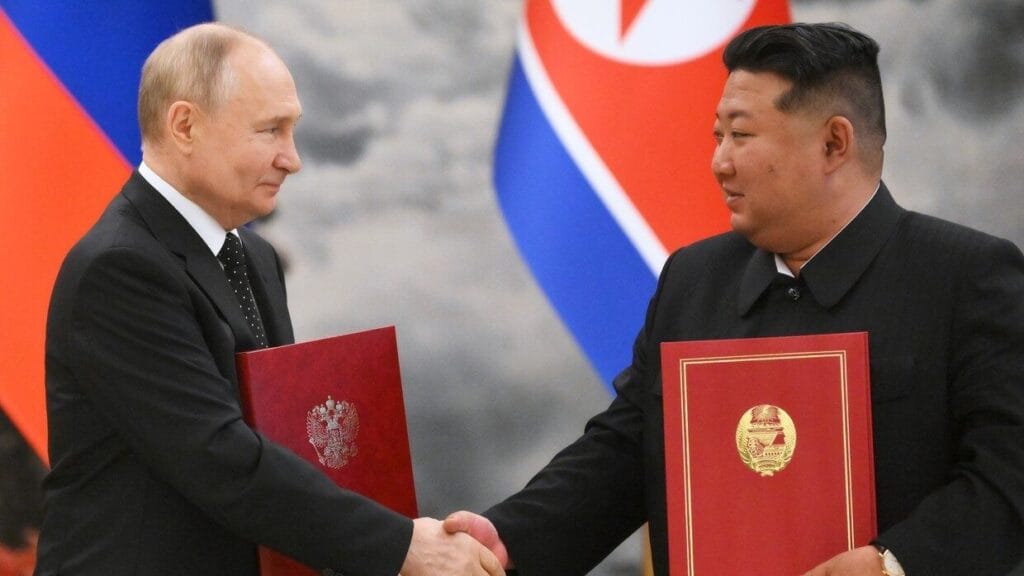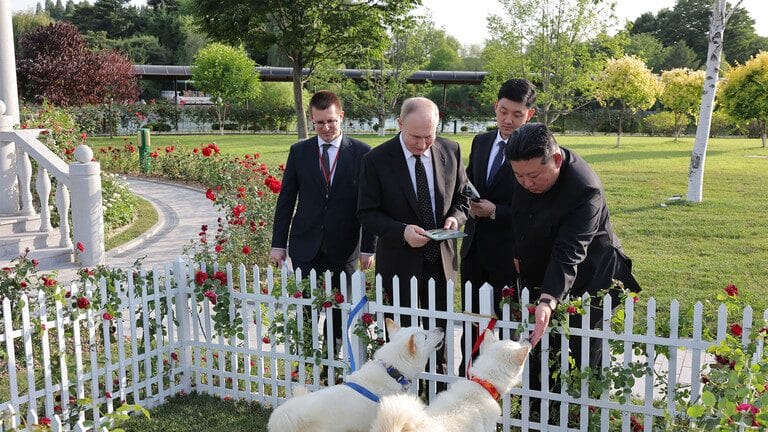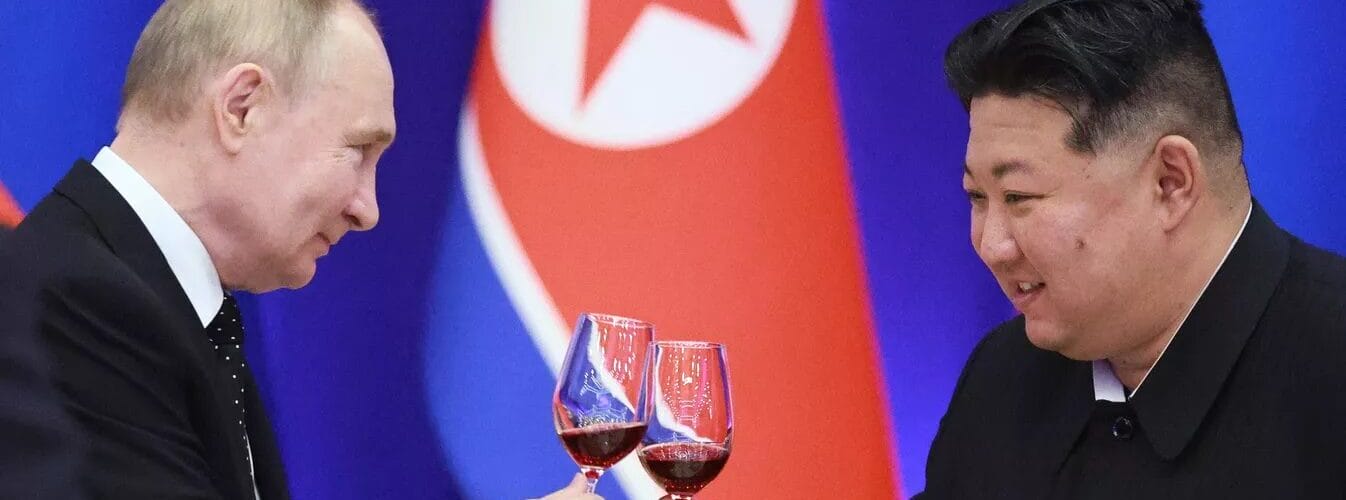This week Russia and North Korea signed a historic agreement to strengthen each other’s countries militarily if they should need it. The historic meeting between Russian President Vladimir Putin and North Korea’s Kim Jong Un in Pyongyang is multifaceted, too many things to note, but I have listed some of the more salient details.
Overview
The following report was written by RT:
Russian President Vladimir Putin paid a state visit to the Democratic People’s Republic of Korea on Wednesday, where he met with the country’s leader Kim Jong-un and participated in comprehensive bilateral talks on economic, security, and global issues.
The trip marked the first time the Russian president had traveled to North Korea since first taking office in 2000, when he visited Pyongyang to meet with then-leader Kim Jong-il.
Putin’s delegation included Foreign Minister Sergey Lavrov, Defense Minister Andrey Belousov, Health Minister Mikhail Murashko, Transport Minister Roman Starovoyt, and several other senior officials, including Kremlin spokesman Dmitry Peskov and Putin’s foreign policy aide Yury Ushakov.
Putin touched down in the North Korean capital in the early hours of Wednesday and was greeted by Kim Jong-un at the airport. Ahead of his arrival, the streets of Pyongyang were decked out with countless Russian flags, alternating with DPRK flags. Multiple banners were also placed along the route of the presidential motorcade, featuring greetings in Russian and Korean, and portraits of the Russian head of state.
A ceremony was also held in honor of Putin’s arrival on Kim Il Sung Square in central Pyongyang. The event featured a performance by a DPRK military orchestra, as hundreds of residents packed the square for the occasion.
Aside from formal negotiations and signing official documents, Putin exchanged gifts with Kim, attended a gala concert, laid flowers at a monument to Soviet soldiers who helped liberate Korea from Japan during World War II, and took part in a reception in honor of the Russian delegation’s visit.
Talks between Kim Jong-un and Putin, which involved the countries’ delegations, lasted for an hour and a half, and were followed by a one-on-one discussion between the two leaders.
During the meeting, both sides expressed appreciation for each other’s support. The Russian leader noted that relations between the two nations are rooted in history, and based on the principles of “equality and mutual respect of each other’s interests.”
Kim stated that North Korea sees Russia as “the most honest friend and comrade” and noted Russia’s mission and role in “upholding strategic stability and balance in the world.” He also expressed Pyongyang’s support for Moscow’s military operation in Ukraine.
Following the bilateral negotiations, Putin and Kim signed a Treaty on Comprehensive Strategic Partnership, designed to “lay the groundwork” for future bilateral relations in all spheres, including cultural and tourist ties, trade, economic relations and security.
The agreement also includes a pledge by Russia and the DPRK to assist each other in case of foreign aggression, as both leaders decried attempts by the US and its satellites to destabilize the situation in Southeast Asia.
The Agreement

Russian paper Sputnik translated the official DPRK-Russia Treaty on Comprehensive Strategic Partnership, detailing what the agreement is – something that is not really discussed in Western media.
The text of the pact reads:
The Democratic People’s Republic of Korea and the Russian Federation, hereinafter referred to as the Parties,
based on common desire and commitment to preserve the historically formed traditions of Korean-Russian friendship and cooperation to build future-oriented interstate relations of a new era, thereby promoting the prosperity and well-being of the peoples of the two countries;
expressing confidence that the development of relations of a comprehensive strategic partnership of the Parties meets the fundamental interests of their peoples and contributes to ensuring peace, regional and global security and stability;
reaffirming their commitment to the purposes and principles of the UN Charter, as well as other generally recognized principles and norms of international law;
reaffirming the desire to protect international justice from hegemonic aspirations and attempts to impose a unipolar world order, to establish a multipolar international system based on good faith cooperation of states, mutual respect for interests, collective resolution of international problems, cultural and civilizational diversity, the supremacy of international law in international relations, and by joint efforts to counteract any challenges that threaten the existence of humanity;
seeking, through strengthening comradely and friendly bilateral ties, as well as expanding and strengthening cooperation in all areas, to bring North Korean-Russian relations to a sustainable level conducive to regional and international peace and prosperity, have agreed on the following:
Article 1: The Parties constantly support and develop, taking into account the legislation of their states and their international obligations, relations of comprehensive strategic partnership based on the principles of mutual respect for state sovereignty and territorial integrity, non-interference in internal affairs, equality and other principles of international law relating to friendly relations and cooperation between states.
Article 2: The Parties, through dialogue and negotiations, including at the highest level, will exchange views on issues of bilateral relations and the international agenda of mutual interest, and also strengthen joint coordination and interaction in international platforms.
In an effort to establish global strategic stability and a new fair and equitable international order, the Parties will maintain close communication with each other and strengthen tactical and strategic cooperation.
Article 3: The Parties shall cooperate with each other to ensure lasting regional and international peace and security.
In the event of an immediate threat of an act of armed aggression against one of the Parties, the Parties, at the request of one of the Parties, shall immediately use bilateral channels for consultations in order to coordinate their positions and agree on possible practical measures to assist each other to help eliminate the emerging threat.
Article 4: If one of the Parties is subjected to an armed attack by any state or several states and thus finds itself in a state of war, the other Party will immediately provide military and other assistance with all means at its disposal in accordance with Article 51 of the UN Charter and in accordance with legislation of the Democratic People’s Republic of Korea and the Russian Federation.
Article 5: Each Party vows not to enter into agreements with third states directed against the sovereignty, security, territorial integrity, right to free choice and [right to free] development of political, social, economic and cultural systems and other key interests of the other Party, and not to take part in such actions.
The Parties do not allow third states to use their territory for the purpose of violating the sovereignty, security, or territorial integrity of the other Party.
Article 6: The parties support each other’s peaceful policies and measures aimed at protecting their state sovereignty, ensuring their security and stability, defending their right to development, and also actively cooperating with each other in pursuing such policies aimed at establishing a fair multipolar new world order.
Article 7: Guided by the goals of maintaining international peace and security, the Parties will consult and cooperate with each other within the framework of international organizations, including the UN and its specialized agencies, on issues of global and regional development that directly or indirectly may pose a challenge to the common interests and security of the Parties.
The Parties shall cooperate and mutually support the membership of each Party in relevant international and regional organizations.
Article 8: The parties create mechanisms for joint activities to strengthen defense capabilities in the interests of preventing war and ensuring regional and international peace and security.
Article 9: The parties will interact to jointly confront growing challenges and threats in areas of strategic importance, including food and energy security, information and communications technology (ICT) security, climate change, healthcare and supply chains.
Article 10: The parties will promote the expansion and development of cooperation in trade, economic, investment, scientific and technical fields.
The parties will make efforts to increase the volume of mutual trade, create favorable conditions for economic cooperation in customs, monetary and financial and other areas, and also encourage and protect mutual investments in accordance with the Agreement between the Government of the Democratic People’s Republic of Korea and the Government of the Russian Federation on the promotion and mutual protection of investments of November 28, 1996.
The Parties will provide assistance to special/free economic zones of the Democratic People’s Republic of Korea and the Russian Federation and organizations with their participation.
The Parties will develop exchanges and cooperation, and also actively encourage joint research in the field of science and technology, including such areas as space, biology, peaceful nuclear energy, artificial intelligence, information technology and others.
Article 11: The Parties will support the development of interregional and cross-border cooperation in areas of mutual interest, based on its special importance for expanding the entire range of bilateral relations.
The Parties will create favorable conditions for establishing direct connections between the regions of the Democratic People’s Republic of Korea and the Russian Federation, promote mutual awareness of their economic and investment potential, including through business missions, conferences, exhibitions, fairs and other joint interregional events.
Article 12: The Parties will strengthen exchanges and cooperation in the field of agriculture, education, healthcare, sports, culture, tourism and other areas, cooperate in the field of environmental protection, prevention and relief from natural disasters
Article 13: The Parties will develop cooperation in matters of mutual recognition of standards, test reports and certificates of conformity, direct application of standards, exchange of experience and the latest achievements in the field of ensuring uniformity of measurements, training of experts and promoting the recognition of test results between the Democratic People’s Republic of Korea and the Russian Federation.
Article 14: Each Party will protect the legal rights and interests of legal entities and citizens of the other Party located on its territory.
The Parties will cooperate on the provision of legal assistance in civil and criminal cases, the extradition and transfer of persons sentenced to imprisonment, as well as the implementation of agreements in the field of return of assets obtained by criminal means.
Article 15: The Parties will deepen contacts between the legislative, executive and law enforcement bodies of the two countries, exchanging experiences and opinions in the field of adoption and application of laws and on other issues of mutual interest.
Article 16: The Parties will oppose the use of unilateral coercive measures, including those of an extraterritorial nature, and consider their introduction illegal and contrary to the UN Charter and international law. The Parties will coordinate efforts and interact in order to support multilateral initiatives aimed at eliminating the practice of using such measures in international relations.
The Parties will guarantee the non-application of unilateral coercive measures aimed directly or indirectly at one of the Parties, individuals and legal entities of such Party or their property under the jurisdiction of such Party, goods, work, services, information, results of intellectual activity, including exclusive rights to them, originating from one Party, intended for the other Party.
The Parties shall refrain from joining unilateral enforcement measures or supporting such measures of any third party if such measures affect or are directed directly or indirectly at one of the Parties, individuals and legal entities of such Party or their property under the jurisdiction of such third party, goods originating from one Party, intended for the other Party, and (or) works, services, information, results of intellectual activity, including exclusive rights to them, provided by suppliers of the other Party.
If unilateral coercive measures are introduced against one of the Parties by any third party, the Parties shall make practical efforts to reduce the risks, eliminate or minimize the direct and indirect impact of such measures on mutual economic relations, individuals or legal entities of the Parties or their property located in the jurisdiction Parties, goods originating from one Party, intended for the other Party, and (or) works, services, information, results of intellectual activity, including exclusive rights to them provided by suppliers of the Parties.
The Parties shall also take steps to limit the dissemination of information that could be used by such third parties to impose and escalate such measures.
Article 17: The Parties will cooperate in the fight against international terrorism and other challenges and threats, including extremism, transnational organized crime, human trafficking and hostage-taking, illegal migration, illicit financial flows, legalization (laundering) of proceeds from crime, terrorist financing and financing of proliferation of weapons of mass destruction, illegal actions that pose a threat to the safety of civil aviation and maritime navigation, illegal trafficking of goods, funds and monetary instruments, as well as illegal trafficking of narcotic drugs, psychotropic substances and their precursors, weapons, cultural and historical values.
Article 18: The Parties will interact in the field of international information security and strive to strengthen bilateral cooperation, including through the development of an appropriate regulatory framework and deepening interdepartmental dialogue.
The Parties will contribute to the formation of a system for ensuring international information security, including through the development of universal legally binding documents.
The Parties will advocate equal rights for states in managing the Internet information and telecommunications network, as well as against the malicious use of information and communication technologies (ICT) in order to discredit the dignity and reputation of sovereign states and encroach on their sovereign rights, and will consider unacceptable any attempts to limit the sovereign right to regulate and ensure security of the national segments of the global network.
The Parties will expand cooperation in the field of combating the use of ICTs for criminal purposes, including the exchange of information to prevent, detect, suppress and investigate crimes and other offenses related to the use of ICTs.
The Parties will coordinate actions and jointly promote initiatives within international organizations and other negotiation platforms, cooperate in the field of digital development, exchange information and create conditions for interaction between the competent authorities of the Parties.
Article 19: The Parties will cooperate in the field of printing and publishing activities.
The Parties will encourage the promotion of Korean and Russian literature in their states, promote the study of the Korean language in the Russian Federation and the Russian language in the Democratic People’s Republic of Korea, and also promote mutual acquaintance and communication between the peoples of the Democratic People’s Republic of Korea and the Russian Federation.
Article 20: The Parties will promote broad cooperation in the media sphere in order to increase the level of knowledge about the life of the peoples of the two countries, promote objective information about the Democratic People’s Republic of Korea and the Russian Federation and bilateral cooperation in the global media space, further create favorable conditions for interaction between national media, strengthen coordination in countering disinformation and aggressive information campaigns.
Article 21: The Parties will actively cooperate in order to conclude and subsequently implement sectoral agreements aimed at implementing this Agreement, as well as agreements in other areas not provided for by this Agreement.
Article 22: This Agreement is subject to ratification and enters into force on the date of exchange of instruments of ratification.
From the date of entry into force of this Agreement, the Treaty on Friendship, Good Neighborhood and Cooperation between the Democratic People’s Republic of Korea and the Russian Federation of February 9, 2000, shall cease.
Article 23: This Agreement is valid for an indefinite period.
If one of the Parties intends to terminate this Agreement, it must notify the other Party in writing. The Agreement is terminated one year from the date of receipt of written notice by the other Party.
Signed in Pyongyang on June 19, 2024, in two copies, each in Korean and Russian, both texts being equally authentic.
Signed on behalf of the Democratic People’s Republic of Korea – Kim Jong Un
Signed on behalf of the Russian Federation – Vladimir Putin
Additional Statements
During the two leader’s meeting, Jong Un presented Putin with “a pair of Phungsan, national dogs of the DPRK, to Putin as a gift in the garden of the Kumsusan State Guesthouse,” according to a North Korean state publication.

Russia presented Kim with an ‘Aurus’ car. They also gave Kim a naval dirk and a “very beautiful tea set.” Putin had also received “nice gifts too,” described as “depictions of our president […] of quite a high artistic value, including busts.”
The following day, during a visit with leaders in Vietnam, Putin said Russia could supply U.S. “adversaries” with weapons as in response to the U.S. allowing Ukraine to fire American weapons inside Russia.
We do not rule out supplying weapons to other countries, including the Democratic People’s Republic of Korea. Let the West think where they might end up.
This important alliance has of course drawn ire from the West. Kremlin spokesman Dmitry Peskov said in a statement today:
On the one hand, it [the reaction of the West] is quite predictable… Because any foreign policy activity of Russia, and even that is concentrated in the regions directly adjacent to our country, is perceived with hostility and, probably, is perceived through the prism of the main direction of Western aspirations to suppress Russia and all its activities.
On the other hand, it causes complete misunderstanding, because cooperation with our partners is in no way directed against third countries. It is aimed exclusively at increasing the well-being of the peoples of those countries that participate in this interaction.
Peskov said
AUTHOR COMMENTARY
Unlike so many other outlets who repeated U.S. neocon propaganda, I tried to provide a little more deeper insight into what the agreement was about.
Needless to say, the obvious point here is that the inevitability of World War III becoming “official” continues to grow with each passing day; as parties are playing cat & mouse and purposefully goading the world into war, allowing for the new monetary system to be installed while the world is distracted and artificially blows itself up.
Mark 13:7 And when ye shall hear of wars and rumours of wars, be ye not troubled: for such things must needs be; but the end shall not be yet. [8] For nation shall rise against nation, and kingdom against kingdom: and there shall be earthquakes in divers places, and there shall be famines and troubles: these are the beginnings of sorrows.
[7] Who goeth a warfare any time at his own charges? who planteth a vineyard, and eateth not of the fruit thereof? or who feedeth a flock, and eateth not of the milk of the flock? [8] Say I these things as a man? or saith not the law the same also? [9] For it is written in the law of Moses, Thou shalt not muzzle the mouth of the ox that treadeth out the corn. Doth God take care for oxen? [10] Or saith he it altogether for our sakes? For our sakes, no doubt, this is written: that he that ploweth should plow in hope; and that he that thresheth in hope should be partaker of his hope. (1 Corinthians 9:7-10).
The WinePress needs your support! If God has laid it on your heart to want to contribute, please prayerfully consider donating to this ministry. If you cannot gift a monetary donation, then please donate your fervent prayers to keep this ministry going! Thank you and may God bless you.








I posit that you could put two year olds on a playground and they could reason better than those in the District of Criminals. Just sayin’ . . .
“We Made a Lot of Enemy’s Around The World – Maybe A Few Of Them
Teamed Up” Keven Bacon – Leave the World Behind (2023)
The BRICS Nation’s Are Fed Up With NATO.!
Red Horse = NATO Vs BRICS
“That Many Nations Would Disappear From the Face of the Earth – That
Russia Would Be the Instrument of Chastisement From Heaven For the
Whole World.” Sister Lucia of Fatima 1957
Although this is scary not gonna lie, we must remember that God is whetting His sword and bending His bow against America.
World War III is just about to become official!
Unlike the unjust war on Iraq when Americans were living high on the hog watching TV, watching football and super bowls, playing video games, going on extravagant shopping sprees, wreaking havoc on Black Friday after their no-longer Thanksgiving day food binges, getting drunk as a lemur and higher than a giraffe’s forehead, and going to their church buildings as the fake professing christians or Roman Catholics…World War III is going to mean frightening, uneasy, and dangerous times.
Don’t always focus on america coz it’s not true, God is whetting his sword against all nations according to all their evil works and no repentance.
Worldwide repentance would only buy a bit more time then the scriptures must be fulfilled.
If we are right with God , he will make us to stand strong through the fiercest storms.
Read Psalm 2 and believe, lest we fall into unbelief through the cares of this world.
Romans 12:19
“Dearly beloved, avenge not yourselves, but rather give place unto wrath: for it is written, Vengeance is mine; I will repay, saith the Lord.”
I have been checking out some of your stories and i can claim nice stuff. I will surely bookmark your blog.
Very interesting subject, thanks for putting up. “Not by age but by capacity is wisdom acquired.” by Titus Maccius Plautus.
Utterly written content material, thanks for entropy.